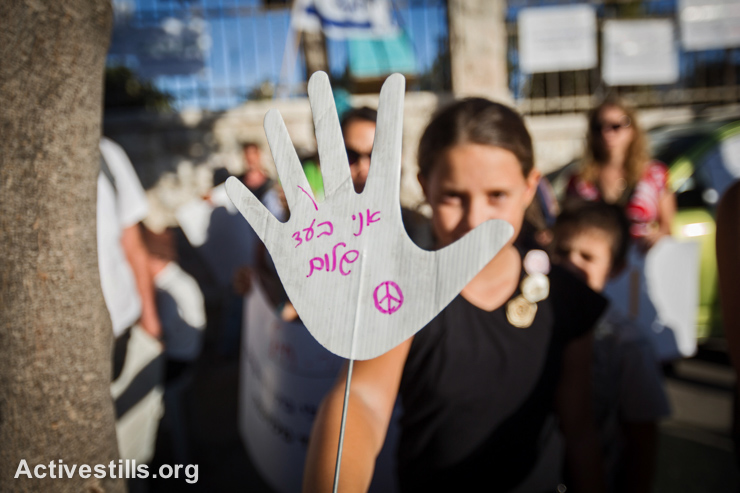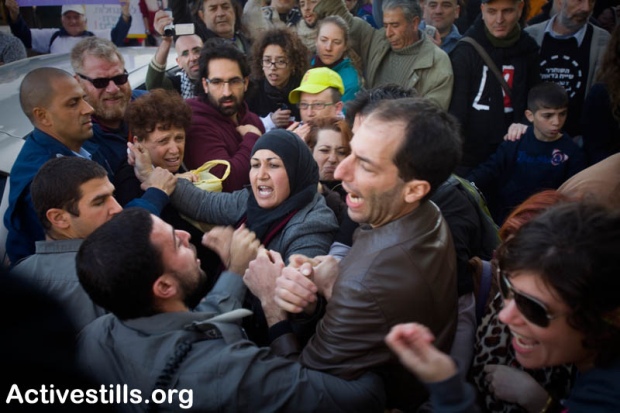As Jerusalem grows more hostile toward anything remotely left wing, Israeli and Palestinian activists are looking to create a new space for activists to meet, plan, and struggle to change the face of the city.
By Sahar Vardi

I was 14 years old when I walked into a small room packed with books in a Tel Aviv alleyway, to hear a lecture about human trafficking for the purpose of prostitution in Israel. It was a subject I knew nothing about, but my youth movement counselor told me about the event, so I went. The truth is I remember very little about the actual lecture, but the experience of entering that space for the first time is something I cannot forget. The Salon Mazal infoshop was the place for these types of lectures — a library where I could look through all the books and learn about various, connected political worlds, and especially a place to meet other activists and talk about the latest protests we attended, and the actions we were planning.
I spent the next two years between Jerusalem, where I live, and Salon Mazal. There I could meet people of all ages who want to talk about politics, who could challenge my politics and allowed me to challenge theirs. A place where I felt comfortable enough not only to join their political actions, but to build and plan them together. Two years later, we opened a volunteer-run vegan bar in Jerusalem named Hadayla. When I needed to sit and rest in city center in the middle of the day, I would head there. When Israel’s president was offered a plea bargain after being convicted of rape, we organized at Hadayla. When we needed to go take down road blocks at the entrance the the West Bank village of Beit Omar, we organized at Hadayla.
No single formula for change
Over the past 13 years, I have taken part in a number of protest movements, and have seen how activism, particularly in Jerusalem, comes in waves. Out of nowhere comes a burst of energy, causing people to organize, distribute flyers, get arrested. In quieter times, we often look back to try and understand what drove us, how we had all that energy, how we were surrounded by more people. Every single time, I see the same images in my head: all of us sitting in the same space. Whether we sat at the pub after a protest to release detainees from Sheikh Jarrah, or if we would get a message on the imminent demolition of a village the following day, prompting us to get up and head out immediately. We would sit in the office of some NGO or in a cafe in East Jerusalem and come up with millions of ideas for political actions. What was clear is that we were sitting somewhere together — where ideas could come to fruition, where energy could be built. And as long as there is activity, more people want to sit in a room full of ideas, energy, and action.

I do not believe that there is a single formula for creating activism and change. I do not believe that it is so easy — nor necessarily prudent — to quantify all protest movements, made up of different people fighting for different topics, into a formula that can be rehashed. Therefore, I propose two elements essential for activism: a space for people to learn, meet others, be exposed to opinions, and formulate positions, and a space to plan and work together.
Today, Jerusalem is the opposite of this kind of space. It is a hostile city, one where a gallery that hosts a left-wing lecture is in danger of being shut down. A city where sitting in a square to make signs for the upcoming demonstration will likely end in cursing and spitting, if not physical violence. A city where Palestinian activists are afraid of even attending political actions, protests, or even meetings in West Jerusalem. A city where businesses are afraid of being seen as “leftist.” In this city, at this time, we need our own space more than ever.
Imbala is a new project we are currently working on, which seeks to create this space. A place for all the different communities of the city: a feminist, anti-racist, queer, multilingual space. Imbala will serve as a library, cafe, gallery, and open space to serve all the communities that make it up. It will also serve as a space for exhibits, parties, lectures, and anything else we want. A place for us to learn, act, and change our city.
Sahar Vardi is an activist based in Jerusalem. This article was first published in Hebrew on Local Call. Read it here.

